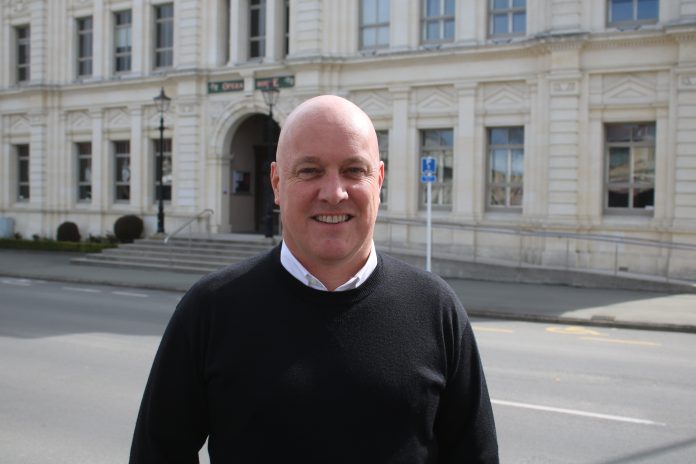
New Zealand farmers are the best in the world but being treated as ‘‘villains’’, National Party leader Christopher Luxon said last week.
‘‘It’s just wrong.’’
After meeting local government and the community in Waimate, the leader of the opposition spoke with farmers at the Papakaio Hall, before a sit-down with the Oamaru Mail, followed by a public meeting arranged by Waitaki MP Jacqui Dean at the Brydone Hotel.
His meeting with local farmers was ‘‘really good’’ and he tried to speak to the rural community wherever he went. He heard recurring themes around the country of an industry over-regulated, with a ‘‘broad and inconsistent’’ set of rules, he said.
‘‘They’re such a valuable industry to New Zealand, and we’ve sort of devalued it, in my view.
‘‘We’ve treated farmers as villains . . . we should be backing them and ourselves to actually continue to lead the world in farming, and so it’s really important that we recognise what they do, and value them for what they do.’’
National did not want the agricultural sector in the Emissions Trading Scheme, Mr Luxon said, prior to the Government’s announcement over a proposal released for consultation to reduce agricultural emissions, by adopting key recommendations from the He Waka Eke Noa partnership, this week.
‘‘The reason’s very simple. We don’t actually have a technology pathway to reduce the emissions at this point . . . But we want the industry to develop its own solution [which is He Waka Eke Noa], and that is an industry-developed solution for how it will deal with its emissions challenges going forward.’’
The concern was, if the penalties became ‘‘so perverse’’ in New Zealand, production would be moved off-shore, he said.
‘‘And insert any country in the world, they’re worse in a carbon-record sense than New Zealand, and as a result, global greenhouse gas emissions get worse, by virtue of a New Zealand bespoke scheme that makes it a disincentive for farmers locally here,’’ he said.
‘‘I said to them, ‘it’s a bit like receiving 10 tennis balls over the net [at once]’, you can’t hit any of them very well, and it’s causing huge anxiety and stress.’’
Mr Luxon did support the Government’s investment in agricultural research, and said it was something National would continue if in power.
He had spent time at the Livestock Improvement Corporation in the Waikato earlier this month and learned about progress involving breeding efficiency.
‘‘Now you can get lighter animals producing the same milksolids as heavier animals, which is good for the environment.
‘‘So that’s how we solve the emissions challenge, is we have to be smart on . . . efficiency, and investments in research and development.’’
The visit to Oamaru had also provided a chance for the politician to return to his Waitaki roots.
At least three generations of Luxons had lived in Oamaru, after arriving here from Devon and Cornwall, England, he said.
‘‘They were fishermen here, but they lived up in Usk St, and my grandfather was born here . . . then they moved up to Timaru, and then from Timaru up to Christchurch, ultimately. So . . .there’s a lot of Luxons in the Catholic section of the cemetery,’’ he said.
Filling jobs was another ‘‘major issue’’ which was not unique to Waitaki, and affected all sectors.
He blamed the ‘‘negative net migration’’ of 12,000 people per year, and an ‘‘anti-immigration’’ Government which had tight restrictions on people coming into the country.
‘‘It’s difficult to understand, because essentially people are leaving. We’re not getting enough coming in and yet we’ve got a massive opportunity with workers and businesses that want to grow.
‘‘At the moment, people can’t grow their companies or their businesses, and therefore opportunities for everyday New Zealanders, because they don’t have the workers to do it.’’
He criticised the Government’s decision to restructure the health system during a pandemic, and while there were ‘‘massive job shortages’’.
‘‘Every single healthcare outcome has deteriorated under this Government.’’
Mr Luxon would like to see nurses coming from overseas put on a ‘‘fast track to residency’’ immediately, which happened in Australia, he said.
‘‘New Zealand, you have to come here for two years, before you can sort of get on to a pathway for residency . . . that’s why they end up choosing Australia . . . If we want to attract the best, we have to be the best. It’s really important.’’
The ‘‘cost of living crisis’’ was another massive issue for people, who were spending more than a third of their income on mortgage payments in Otago, an increase of 15% since last January, he said.
This was from the Government spending $1 billion more each week than the National Government spent back in 2017, and it was also raising $15,000 extra tax on average out of each household as well, he said.
‘‘The worst thing is, these guys are spending all that money, more. They’ve hired 14,000 more people, and yet they’re getting worse outcomes on education, health, housing, crime, and they’re the big things that people care about.’’
Mr Luxon was excited about the ‘‘huge opportunity’’ for the country, and that was why he had come to politics.
‘‘I think, yes, we have some big challenges, and we’ve got to call reality as it is today, but we have a huge set of opportunities too.’’



